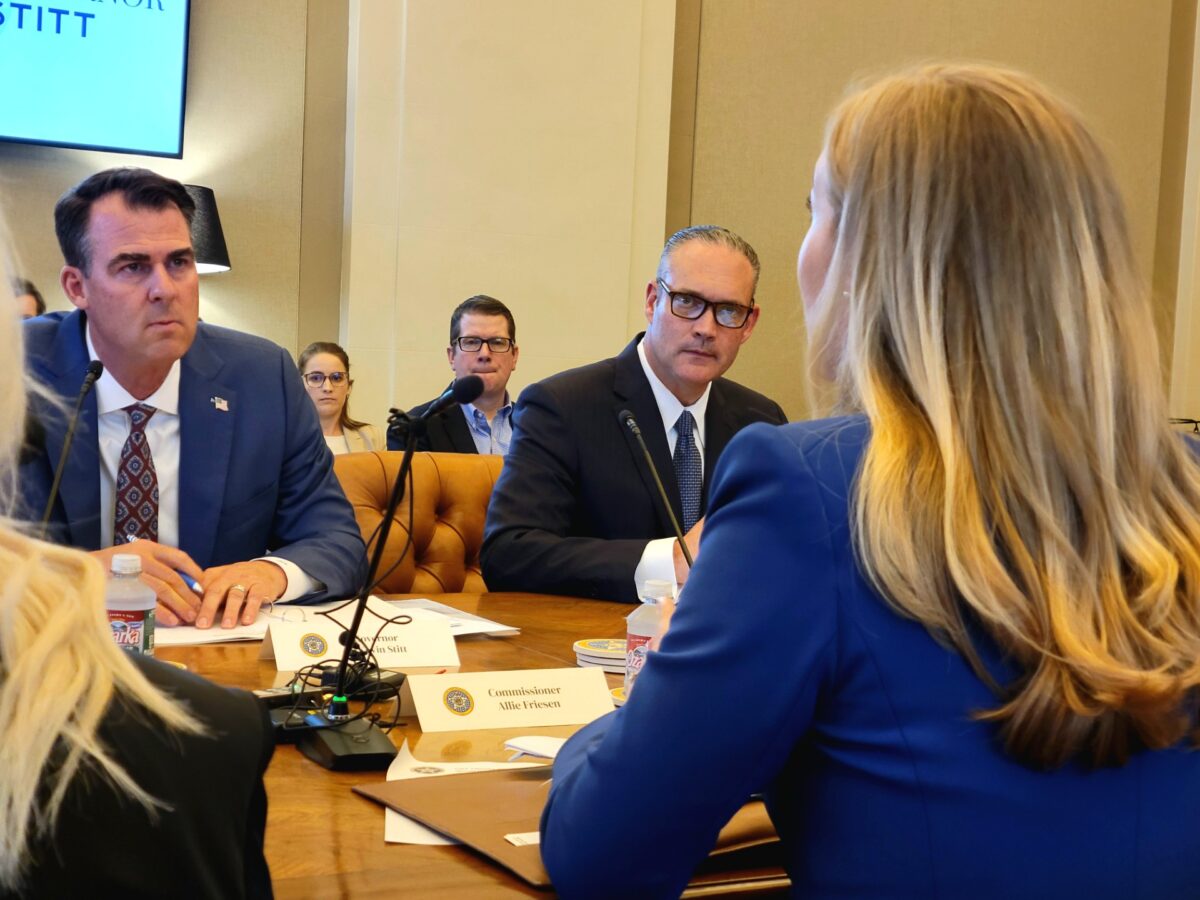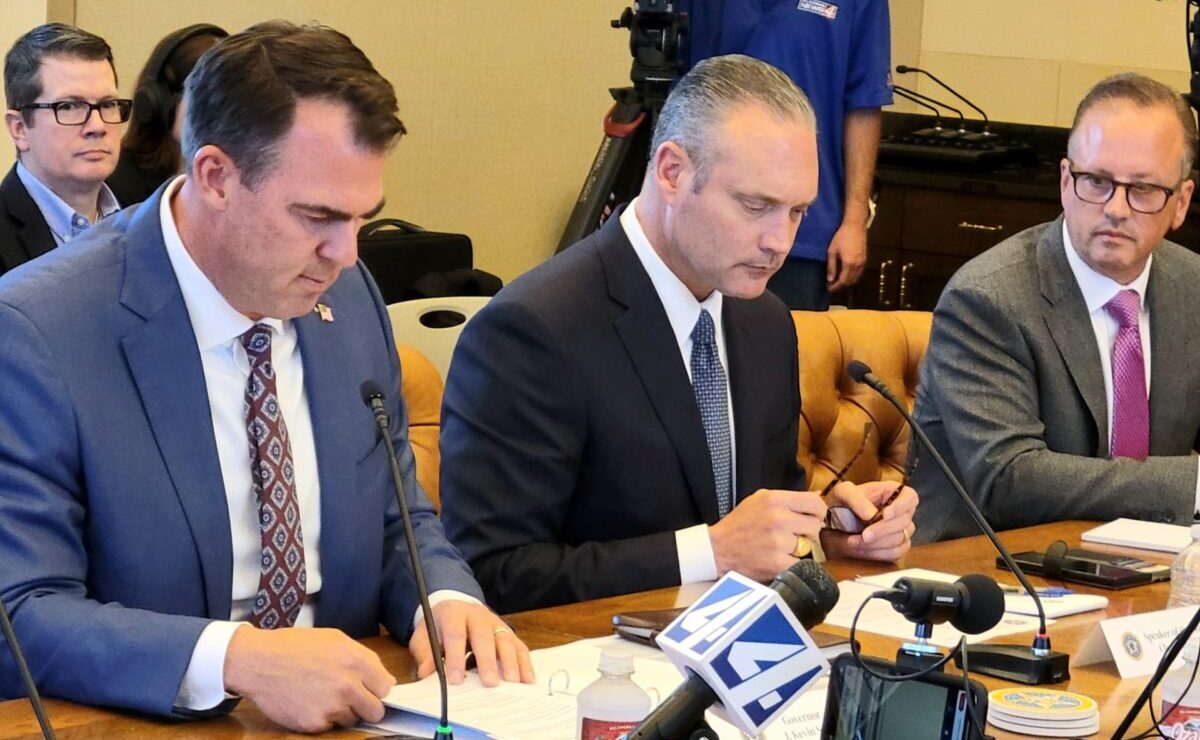
Although a federal judge has advanced an amended consent decree to settle a class-action lawsuit dealing with Oklahoma’s competency restoration system for those accused of crimes while afflicted with severe mental illness, Gov. Kevin Stitt and his appointed mental health commissioner still oppose it.
Stitt plans on calling another meeting of the Contingency Review Board to decide whether to accept the consent decree as crafted, a spokeswoman for the governor said last week. A consent decree is a court-approved improvement plan agreed to by parties to settle litigation.
Filed in March 2023 by attorneys on behalf of incarcerated Oklahomans facing significant delays for treatment to restore their mental health competency, the Briggs et al v. State lawsuit has been described as “indefensible” by Oklahoma Attorney General Gentner Drummond’s office. As a result, Drummond and plaintiffs’ attorneys have proposed a settlement involving a consent decree, which would require the state to create additional mental health restoration services while establishing and meeting new treatment standards over at least a five-year period.
In granting preliminary approval to the proposed consent decree, U.S. District Court Judge Gregory Frizzell set a Jan. 15 hearing at which he could grant final approval if the Contingency Review Board — which consists of the governor, the House speaker and the Senate president pro tempore as voting members — votes to approve the proposal on behalf of the state. The CRB exists for consideration of large lawsuit settlements when the full Oklahoma Legislature is not in session, and several factors mean it has a narrow window in which the obscure board could approve the proposed decree.
Both House Speaker Charles McCall (R-Atoka) and Senate President Pro Tempore Greg Treat (R-OKC) are set to leave office Nov. 19 when their final legislative terms expire. Their designated successors cannot take any official action until legislators formally organize, which will be Jan. 7, according to McCall. If a CRB meeting cannot be scheduled with McCall and Treat as members, their successors would have about a week to meet before Frizzell’s hearing in the U.S. District Court for Northern Oklahoma.
“I trust them if the decision comes before them to make a decision,” Speaker-designee Kyle Hilbert (R-Bristow) said Aug. 29. “Then, if they don’t make a decision or if it’s not voted on by Nov. 19, Sen. (Lonnie) Paxton and I would not have the authority or ability even if we wanted to to vote on it until Jan. 7, and so what if anything that we would be looking at in January may look different from what is being talked about today.”
Hilbert made his remarks during a panel discussion at the Tulsa Regional Chamber’s annual State of the State luncheon. Paxton, who is the designee to be the next Senate president pro tempore, offered similar remarks about trusting Treat and McCall to consider the consent decree because they “still have the authority” through Nov. 19.
“I’m still learning,” said Paxton (R-Tuttle). “I still want to talk to Gov. Stitt. I still want to talk to the attorney and kind of get their perspectives of it. When I just read this, and this is very preliminary (…) I see a lot of red flags in things I am reading and things I am very concerned about with agreeing with this.”
With all the complicated timelines and considerations, it is also possible that state approval of the consent decree falls to the full Oklahoma Legislature, which is set to convene for its next regular session Monday, Feb. 3. Once the Legislature is in session, it becomes the body responsible for considering lawsuit settlements, not the CRB.
Lawmakers are already facing questions about whether to appropriate potentially upwards of $100 million to address cost increases on ODMHSAS’ new mental health hospital in OKC — called The Donahue — and the funding gap on OU’s planned pediatric behavioral health hospital, neither of which has opened despite legislative support. It’s possible the proposed consent decree on competency restoration services could become another issue on the plate of new legislative leaders in 2025.
Plan would require Legislature to change law in 2025
Meanwhile, Stitt’s availability to chair a meeting of the Contingency Review Board may be dependent on his recovery from a late-September health scare. After a routine checkup, doctors discovered Stitt had significant blockage in a main artery, said Abegail Cave, the governor’s communications director. He underwent intravenous surgery on Friday where the doctors repaired the blockage with a stent, she said.
Cave said Stitt is doing well and that he returned to the governor’s office Sept. 23.
Meeting as the CRB on Aug. 28, Stitt and McCall voted to table action on the proposed consent decree. Treat did not attend the meeting because of a family emergency.
Drummond, who is representing Mental Health and Substance Abuse Services Commissioner Allie Friesen and Debbi Moran, interim executive director of the Oklahoma Forensic Center in Vinita, also did not attend the Aug. 28 meeting. Drummond did, however, criticize Stitt for calling the meeting and opposing the consent decree, which Stitt and McCall criticized for its estimated costs and uncertain date of conclusion.
“The governor appears bound and determined to force Oklahomans to ultimately pay untold millions of dollars and ignore a years-long failure of the state Department of Mental Health and Substance Abuse Services,” Drummond said in a press release. “Rather than seizing an opportunity to deliver justice and save taxpayer dollars, Gov. Stitt would rather stage political theater. This is disappointing, if not entirely surprising.”
Two days later, on Aug. 30, Frizzell said a section of the proposed consent decree that would establish outpatient pilot programs to provide mental health competency restoration services for detainees held in Tulsa, Oklahoma, McIntosh and Muskogee county jails would violate state law. Frizzell wrote in his order that state law requires ODMHSAS to take physical custody of a person requiring competency restoration services and does not permit outpatient restoration treatment as originally described in the consent decree proposal.
On Sept. 19, Frizzell approved modifications to the proposed consent decree filed by the plaintiff attorneys and Drummond. The new language states that “the development and implementation of the Contingent Community-Based Restoration Treatment Program is contingent on Oklahoma law permitting, either by new legislation or by an Oklahoma appellate court opinion, the department to provide outpatient community-based restoration services.”
The revised consent decree also states the Mental Health Department will use “best efforts” to obtain passage of Oklahoma legislation that permits the agency to provide community-based outpatient competency restoration services, which have become more popular around the country in recent years. It also states that after the consent decree receives final approval and a change in law is achieved, ODMHSAS shall work in consultation with plaintiff attorneys and consultants to develop and begin implementation of a plan “to be approved by the consultants” within 90 days.
The modified language also states that, at the end of one year after implementation of the pilot program, the consultants, ODMHSAS’ designated representative and its counsel along with plaintiff attorneys will evaluate the data, practices and outcomes of the pilot program “to determine whether, and how, a community-based restoration program may be expanded to other Oklahoma counties.”
Frizzell in his order ruled that the proposed amendments are consistent with Oklahoma law.
“Accordingly, the court provisionally concludes that the proposed consent decree is remedial in nature, sufficiently narrowly tailored and consistent with Oklahoma law,” he wrote.
The proposed consent decree also would require ODMHSAS to end its existing jail-based competency restoration program and start new jail-based competency restoration programs in Tulsa County and another county not specified in the agreement. Detainees in need of competency restoration services not provided by the pilot programs would be transported to Vinita in northeast Oklahoma, and the Oklahoma Forensic Center there would be held to faster timelines for provision of restoration services, which generally involve the administration of anti-psychotic medications.
In the pilot program phase of the proposed consent decree, no community-based or jail-based services are prescribed west or south of Oklahoma County.
Drummond: Proposed decree will deliver ‘long-delayed justice’

While the tweaked language gave Frizzell confidence to grant the proposal’s preliminary approval, ODMHSAS Commissioner Allie Friesen remains skeptical that it would provide the necessary framework to address systemic issues without creating the sort of unending oversight requirements that have frustrated state leaders under the Department of Human Services’ Pinnacle Plan.
On Sept. 20, Friesen issued a statement saying the modified proposed consent decree does not align with best practices for competency restoration as established by evidence-based research. Instead, it poses significant financial penalties that could jeopardize ODMHSAS’ ability to provide critical services to Oklahomans in need, she said.
“This consent decree threatens to leave hundreds of individuals without the treatment they desperately need. It will force individuals, many suffering from severe mental health crises, to remain in jail cells without the care they so desperately need,” Friesen said. “This situation is inhumane and heartbreaking. For the attorney general or anyone else to suggest that this plan serves the best interests of those most affected — Oklahomans in need of compassionate care — is unfathomable.”
Stitt echoes Friesen’s concerns, Cave said.
“The governor does not support the consent decree and will continue to push back on its implementation,” she said.
Drummond, in a statement, said he is pleased Frizzell gave preliminary approval for the settlement.
“This consent decree will allow Oklahoma to deliver long-delayed justice for crime victims and save the state millions of dollars by ensuring due process for criminal defendants who have been deemed not competent to stand trial,” he said.
Paul DeMuro, one of the plaintiff attorneys, said Sept. 25 that Frizzell’s approval of the modified consent decree is “a big step forward toward improving a system that everyone understands is and has been severely broken for many years.”
“We are excited that the plan and the consent decree will be put into place and will soon start reducing the wait times of people who are experiencing mental illness and who are languishing in our county jails,” DeMuro told NonDoc.
He said attorneys have been “in close contact” with the governor’s office throughout the process and that he is willing to talk with the governor or legislative leaders about the merits of the plan outlined in the consent decree.
“I’m hopeful that, you know, we can all get through this and move on to the solution,” DeMuro said. “The frustrating thing from my perspective is everyone agrees there’s a major problem and the department’s delivery of restoration services is flawed and violating people’s constitutional rights — hundreds of Oklahomans’ constitutional rights — on a daily basis.”
The Oklahoma Attorney General’s Office originally filed a motion to dismiss the lawsuit. But with the AG’s Office eventually calling the litigation “indefensible,” Drummond’s focus shifted to settlement with a consent decree that would describe certain pilot programs and require the state to develop a full plan to improve competency restoration processes and services within 90 days.
The Forensic Center in Vinita is the only state facility fully equipped to provide secure inpatient competency restoration services. It also houses criminal defendants found not guilty by reason of insanity or mental illness until such a time that they are released from custody, a two-purpose mission that plaintiffs have said creates capacity problems that violate the rights of those needing treatment by keeping them in county jails.
Stitt, McCall concerned about proposal’s eventual cost

The proposed consent decree would empower a trio of expert “consultants” to review the state’s progress and prescribe changes. The consultants would be paid $450 per hour for their work on the decree, which would last five years at a minimum.
During last month’s CRB meeting, Stitt and McCall said they were concerned that the proposed consent decree could last longer than the five-year period outlined in the settlement offer, costing the state additional millions of dollars if the “consultants” refuse to sign off on the decree’s conclusion.
Friesen, appointed by Stitt as mental health commissioner in January, said “a conservative estimate” would put the cost at about $96 million over five years. While criticizing the proposal’s inclusion of non-medical professionals in decision making about mental health care, Friesen said improvements could be made without a consent decree, noting that multiple changes already have occurred at ODMHSAS since she became director in early 2024.
Asked about Friesen’s concern that costs associated with the proposed consent decree could balloon, DeMuro scoffed at the criticism.
“I know some of the statements I’ve heard from the commissioner — public statements from the commissioner and the governor and the governor’s office — and they’re utterly unfounded, made out of whole cloth, plucked from thin air,” DeMuro said. “And I’m deeply concerned about the misinformation that’s being trafficked about this consent decree by people who know better. Even though we’ve requested (it), I have yet to see any financial analysis that would even remotely support some of the figures I’ve been hearing.”





















